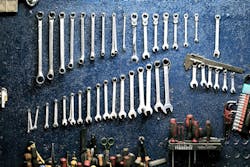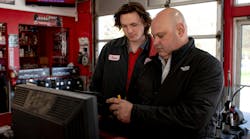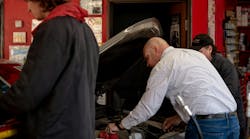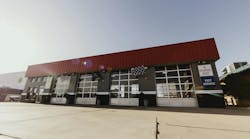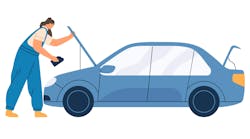The hyper competitive market of today’s quick lube industry insists owner/operators know what their customers want and deliver it.
“Being able to look at what the market is demanding and responding to the demand is absolutely crucial to any quick lube business,” said Tony Davis, CFO of Snappy Lube in Knightdale, North Carolina.
Appropriately reacting to the market was a trend we quickly noticed the importance of, as we investigated what made stores with high ticket averages and stores with high car counts different. We asked operators with at least one high-ticket-average or car-count location the same questions about business philosophy, customer service, uniqueness, maximizing profit and additional service offerings. What we discovered was simple. Successful operators knew what their customers wanted and were willing to pay for, and reacted accordingly.
Our conversation usually started talking about business philosophy. “What is your business philosophy,” we’d ask. Without fail every operator we interviewed used different words but had the same answer: the customer comes first.
“We try to provide a valuable service in a friendly, warm atmosphere and timely manner to our customers,” Davis said.
Davis works at Snappy Lube, a 38-store chain whose stores are primarily high-ticket-total stores with a few high-car-count stores mixed in. But Snappy Lube isn’t the only one putting its customers first. Bill Wolfmeyer is a single-store owner/operator of a high-car-count store in Quincy, Illinois, called Lube Pros. Even though Wolfmeyer’s primary profit comes from getting cars in and out of his bays — not from selling add-on services — he’s built a long-standing business on similar customer first principles.
“We’ve been in business for 22 years. We’ve built our business on good customer service, not on brand name or company name just the good, ol’ fashioned standard of fast, honest and dependable service,” Wolfmeyer said.
After almost 30 years reporting on trends in the quick lube industry, we knew both models of business were successful for many owner/operators. However, we wanted to know the best way to determine whether a high-ticket average or high car count model was best for a particular business or location. We discovered answering the question, “What makes customers come to you” could help owner/operators decide what was the most profitable option for them. Did fast service, one-stop-shop offerings, exceptional service or friendly employees draw customers in? Every customer who pulls up to your bays does so for a reason. Find out what it is, and maximize on it.
Chris Avery, president of Snappy Lube, took it back to a simple truth.
“At the end of the day, you’ve got to keep cars running through the bays,” Avery said. “We look at several things, and most of the time, if you’re a multi-store operation, most likely you’re going to be forced to be both a high-ticket-average and high-car-count chain. If push comes to shove, we lean to the ticket average side of things, but we’re careful to not diminish or say the car count stores don’t have a place, because they definitely do. As a general rule, go to your customers and give them what they want.”
Keep your competition and what they are offering in mind, too. Think about where you can fill in the gaps and capture the customers who either aren’t satisfied with the services they’re offering or who have needs not being met.
“We know some of our competitors don’t have a reputation for thorough car checks,” said Jim Dailey owner and operator of Express Care, a high-ticket average store in Lubbock, Texas. “We complete 18-point checks on every car driving through our bays. That includes making sure everything is done properly, all fluids are topped off, the battery is full and the cables are clean.”
Think about what your shop does best. Wolfmeyer believes his smaller density town of Quincy has a hard time holding onto high-ticket-average customers because of the locale. That’s why he focuses on fast, dependable service.
“We’re not in a high population area,” Wolfmeyer said. “Quincy’s population is only 44,000 people, plus we draw from about a 50-mile radius. We have a real sense of community and have found our customers don’t come back if we tried to sell them a lot of stuff. Sure, they may return a few times, but eventually they stopped visiting. I think the high-ticket-averages probably work better in high population areas, because there is always someone around the corner to take the place of the customer who may or may not return. I’ve watched quick lubes try to do a similar thing here, and it isn’t long before they’re out of business.”
It’s proof there isn’t one recipe for success. High car count stores can’t just push cars in and out, their operations must be strategic, but so must high-ticket-average stores. If high-ticket-average stores try to sell everything, they won’t sell anything. High-ticket-total shops who usually push everything on the customer at once don’t work. Instead, they must look to the services that will maximize their profits and benefit the customer the most.
“The easiest sell — and the most profitable — for us is a cabin air filter. It’s the most overlooked additional item. Because we’re in West Texas, where we get every kind of weather condition imaginable, we sell a lot of them,” Dailey said.
Snappy Lube builds value into their services, starting with their management team. They also have an advantage not all shops in the U.S. do.
“We’re a unique market in North Carolina, because here, we’re able to do state inspections. The customer base is pretty much trained to go to the quick lube business, so when we’re asked what our highest selling service is it’s probably wiper blades and light bulbs as a result of state inspections. If you take that out, you’re probably looking at synthetic oil changes and high-mileage services,” Avery said. “We stand out with our pro-customer price points. If a customer is coming into spend X amount of dollars, chances are they’ll be able to get two, three or four services at our store versus some of the other lubes out there, so the perceived value is pretty strong.”
“We want to make sure our customers get the very best value and service and we do that by making sure we empower our management team so they can take care of all the needs of the customer,” Davis said. “We provide them with all the tools they need. If they don’t have a tool, we do our best to get it for them.”
When it comes to high-car-counts versus high-ticket-averages, let the market determine where you steer your business. If there’s a need for a fast, dependable and simple model shop in your community, maybe your shop will be more successful as a high-car-count store; react to the market. If your community has a need for a one-stop-shop, where speed may not be as important as getting everything done at once, add-on services could be your thing; react to the market. However you react, keep in mind your capabilities, customers and don’t mess with a good thing.
